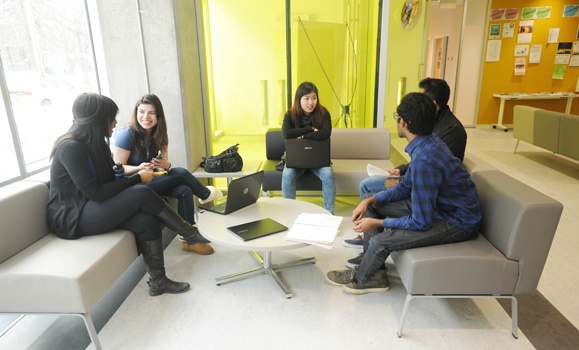International students at Dal will soon have another avenue for honing their career-building skills and gaining valuable work experience through a new pilot program launching early next year.
Any full-time international students with a valid study permit are eligible to apply for part-time paid positions with on-campus staff and faculty employment partners through the International Student Work Experience Program (ISWEP).
Developed by Career Services in collaboration with the International Centre, the program was designed with current Canadian labour market trends in mind ŌĆö taking into consideration the impact of precarious work culture and the skills gap on international students in particular.
ŌĆ£For our international students, itŌĆÖs not that they donŌĆÖt have skills when they graduate. ItŌĆÖs that they often donŌĆÖt know how to articulate them in a job search context,ŌĆØ says Karen McCrank, director of career services at the Bissett Student Success Centre.
McCrank says participants in the program will learn as much about navigating the job search process in Canada, clarifying career goals, and the importance of networking as they will about the actual jobs they take on. ISWEP will also educate students on the types of skills and jobs that can help them secure a work permit following graduation or if they are looking to apply for permanent residency.
"A program like this can really set them up for success in that.ŌĆØ
Engaging employers
Currently, the plan is to accept two cohorts of 70 students each for the coming Winter 2020 and Fall 2020 terms, with the potential to extend the program beyond that depending on evaluations of initial outcomes. Students from all campuses, including the Agricultural Campus in Truro, can apply.
McCrank says another unique aspect of ISWEP is that it also offers training for the employers and supervisors, who ŌĆö like students ŌĆö must apply to be part of the program. She says part of the intention is to bust myths around the difficulties of hiring international students as employees and to help employers understand the value of having international candidates in the work environment.
ŌĆ£ThereŌĆÖs a lot of misconception around ŌĆśoh, I canŌĆÖt hire an international student, what if they donŌĆÖt have the right documents?ŌĆÖŌĆØ she says, noting that ISWEP will aim to inform and reduce fear from employers around work permits and how they work.
She says thereŌĆÖs also a lot of bias with employers around language.
ŌĆ£Part of the conversation is to help them understand that just because a student has a strong accent doesnŌĆÖt mean they are unable to communicate ideas or write a really good report,ŌĆØ she says. ŌĆ£Part of this for us is helping our campus foster inclusive environments for our students.ŌĆØ
To ensure the best outcomes, employers and international student participants alike will have a part to play in tracking progress throughout the 12-week work period.
ŌĆ£We provide tools for them to help the students do the learning weŌĆÖve set out for them. Every student has a learning plan that they need to complete within the first three weeks. We encourage and support the supervisors in doing that with their employee.ŌĆØ
Essentially, employers learn how to support studentsŌĆÖ learning and development, says McCrank.
A flexible approach
Students will have some flexibility around work schedules and the number of hours they wish to take on week-to-week. McCrank says data have shown that 12-15 hours of work a week typically has no negative ŌĆö and sometimes positive ŌĆö impacts on student academic performance.
Students who apply to the program will have access to a range of different kinds of work experiences, including peer-to-peer jobs, research jobs, and administrative-type jobs. Each opportunity will have been accepted based on whether it is a good fit for the program.
She says the program will be a natural fit for students who might be preparing to apply for co-op positions as part of their academic programs or those who might just be in the early stages of learning about what it might be like to work in Canada.
ŌĆ£WeŌĆÖve looked at some data that shows students do want to stay in Nova Scotia,ŌĆØ says McCrank. ŌĆ£This is a way for us to help students understand that there are opportunities here and to support them in staying.ŌĆØ
Students interested in learning more about the program can attend one of a series of upcoming information sessions, starting this Friday (November 1) on the Agricultural Campus.
Details about upcoming sessions below.
╠²
- Agricultural Campus information session: November 1st from 11:00 a.m. to 1:00 p.m. in the Extended Learning Classroom.╠²
- Studley Campus information sessions: November 4th from 10:30 a.m. to 12:30 p.m. in the Student Union Building, room 270, Council Chambers. November 5th from 10:30 a.m. to 12:30 p.m. in the Student Union Building, room 303.╠²
- Sexton Campus information session: November 6th from 4:30 to 6:30 p.m. in the Emera IDEA building, room 1004, Romero Classroom.╠²
Registration is required for all.

